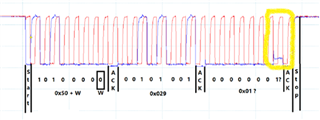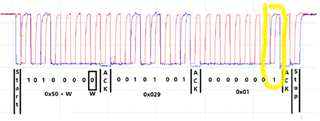Other Parts Discussed in Thread: ISO1540, ISO1640, TCA9535, PCF8574
Hi There,
As per datasheet, ADS1110 is responding to I2C General Call. It, then, logically responds by an Ack to a 00h device address on the bus.
Here is my question:
Does it acknowledge 00h address ONLY if it is the FIRST byte after start signal ?
Configuration:
On my system, ADS1110 and AT24C04 (EEPROM) are connected on the same I2C.
Writing data to AT24C04 requires 3 bytes (1 byte for Device address, 1 byte for EEPROM byte location and 1 byte for data to be written).
When ADS1110 is connected on the bus I'm experiencing strange behavior, cannot write byte value 01h in the eeprom.
Looking into the i2c frame with a scope it turns out that the lsb bit of the data byte is somehow pulled down when it shouldn't.
Below is the scope screenshot with ADS1110 connected on the i2C bus and writing 01h in location 29h (AT24C04 address is 50h): look at the lsb of the 3rd byte (yellow):

Below , same writing, but ADS1110 is not connected to the bus (ADS1110 is mounted on an add-on board which can be unplugged)):

My question is : Can the 2nd "ack" and the seven following bits (forming together a 00h byte) be understood as a General Call by ADSS1110 ?
This shouldn't because it is not an address byte, but so far that's my only understanding.
any other idea ?
Thanks for Help.
René
PS:here is the add-on board schematic:

